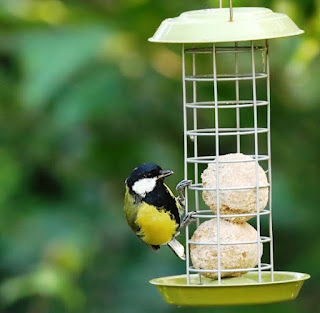by Cowboy Bob Sorensen
Not surprisingly, Scientific American promoted evolution in "Humans May Be Influencing Bird Evolution in Their Backyards." The study focused on Great Tits in the U.K., and said that evolution is happening in "real time."
I like tits as much as the next guy, but will not be seeing Great Tits in these parts. We like the Tufted Titmouse, and Blue Jay, and Northern Cardinal, and Rose-breasted Grosbeak, and... One way these owlhoots stack the deck is by labeling every kind of change as an example of evolution, even though what is observed has nothing to do with goo-to-Great Tit evolution. That's the ol' bait and switch equivocation fallacy.
I rode off the trail a bit, didn't I? Getting back to it now, a long-standing "evidence" for evolution cites the Galápagos Finches (also called "Darwin's Finches", even though he didn't know what they were when he visited there). They had variations in beak size, which was simply variation. Later, it was learned that their
variations involve epigenetics. The same principles probably apply here. As we have seen many times, the Master Engineer has equipped creatures to adapt to changes in their environments.
Altruism is a problem for evolution. We help each other and want to do good to God's creatures, but something these disciples of the Bearded Buddha need to address is altruism in animals. Evolution and natural selection are supposed to be about every creature for itself, but
altruism happens in birds and is known
between different species of animals. Are they influencing evolution? Not hardly!
To be consistent, evolutionists should admit that since we supposedly had the chops to evolve, we can do whatever we want. If having a hand in the evolution of something else helps us survive better, deal with it. But they're not consistent.
The Scientific American article also brought up the evolutionary icon of the Peppered Moths, which they used as support for the idea of humans influencing evolution. (For information on that and other false claims, see "The Peppered Moth: Icon for Creation.") The researchers point out that humans do indeed influence behavior and variations in Great Tits, but falsely praise evolution. They admitted there's a big "if" and the whole thing is a hypothesis, plus hedging their bets with "may be". Despite the uncertainties, they're still sure of evolution, you betcha.
This brings us to some other interesting points. There is a huge debate whether or not humans should feed birds or other animals
because it is harmful to them. Part of that is because they may become dependent on us, but this ignores how birds and other critters have lived with humans for a mighty long time. They were designed by our Creator, and their inner mechanisms will compel them to find food elsewhere if a source disappears.
Live Science made an unnecessary remark about how birds "have evolved to defend sources of food," but had some interesting points in "
Study: It's OK to Feed Birds."
There are also benefits to feeding birds, both for them and for us.
However, we need to learn how to feed them responsibly. One example I like to bring up is that people like their hummingbird feeders, but may not realize that they
need to be cleaned so the birds are not poisoned. Biblical creationists know that
we are stewards of God's creation, and learning about responsible feeding and possible harm to them should be considered. See "
Should We Be Feeding Birds and Other Wildlife?" and "
Benefits of Bird Feeding."
When speculating that humans may be influencing evolution, that load of hooey is based on equivocation. While learning how to discern truth from speculation pass off as science, we can also gain knowledge about how to properly take care of God's creatures. If I was in Britain, I'd be feeding Great Tits as well.
